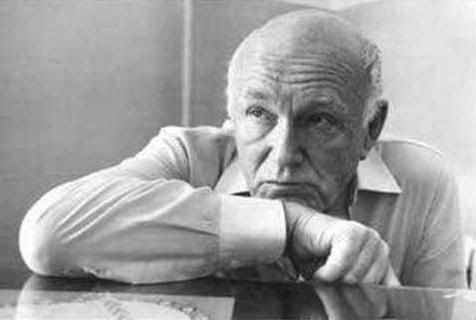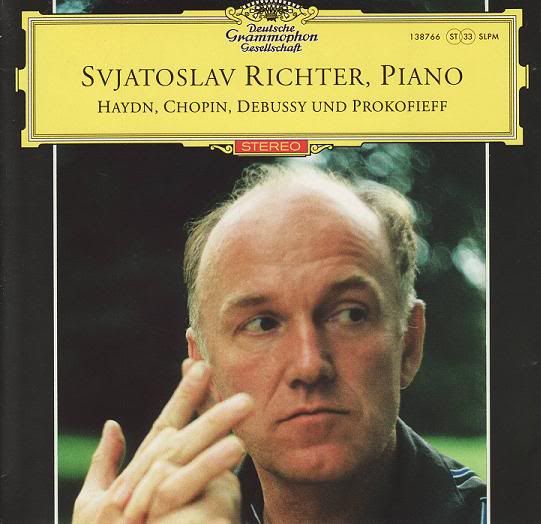I always thought fine distinctions among musical performances, and performers, were lost on me. A lot of them surely still are. It takes a truly astounding player to penetrate my obtuse musical understanding.
Well, I discover one such now and then. The latest is Sviatoslav Richter, the Russian pianist. I had heard of him, of course, knew he was considered one of the greats; had no idea why. Almost by accident, I borrowed a Richter disc from the library. It didn't take long to realize this man was a communicative genius. Now I am kind of a Richter addict, having added some of his recordings to my collection and looking forward to getting acquainted with others.
How to describe what I hear in this artist? It is not mere interpretation. Every pianist of professional rank interprets a piece he plays; there's nothing special about that. But Richter seems to be playing the music from the inside out, conveying its essence. Every phrase is characterized, its meaning distilled.
I've heard quite a few famous pianists, mostly in recordings, a few in concert. (Many years ago, Arthur Rubinstein. I was probably too callow to appreciate him, and he was quite advanced in years so probably his fingers weren't as agile as they once had been, but I'm sure the spirit was still there. In any case I have virtually no musical memory, can't remember the sounds I've heard played. I do remember this: at one point I glanced around the auditorium and saw hundreds of enraptured faces, seemingly transfigured by the beauty of what they were hearing. And I remember wondering: what can it be like, to have the gift of making so many people happy by doing what you do?)
Anyway, while it would be incorrect to say I am not impressed by technical ability -- on the contrary, I never fail to marvel at how a pianist can create music from little lines and dots on paper, and move so swiftly and accurately over the keyboard -- I have learned that immense talent isn't always quite enough. There have been virtuosic performances that left me cold. Perhaps that was partly just my lack of appreciation, but I do recognize the skill involved. Sometimes it just doesn't have anything to say to me.
So far, I haven't heard anything played by Richter that didn't seem addressed to my soul.
What is particularly striking is that he seemed to have an intuitive understanding of many different styles and eras of composition. Take the recital above: Haydn, Chopin, Debussy, and Prokofieff! So diverse, except for their talent, that they might be from different branches of the human tree. But Richter seems fully in tune with each, as if he had internalized their individual sound worlds. The Haydn, for instance, reflects feeling expressed through restraint, the aristocratic milieu in which the piece was created, but there is none of that brittle and tinkly "period performance" artificiality that you encounter so often nowadays. And he's equally at home with Prokofieff (whom he knew personally), who was a romantic by temperament, a modernist by inclination. Richter "gets," and expresses, both.
He was more or less of the same generation of Soviet musicians who opened a window to the West at the height of the Cold War, the generation that included Emil Gilels and Mstislav Rostropovich. I've read that European and American listeners were astounded when they heard Richter on primitive Soviet-made recordings before they'd ever had the opportunity to hear him in person. It was a major cultural event when Richter was allowed to travel to Europe and America for concerts.
His personality is often described as "enigmatic." He never seems to have gotten into hot water with the Soviet system in the way Shostakovich notoriously did, yet was no Communist booster. Although too depressed to play in public for months on end, concerts were his preferred medium. He disliked the recording studio, so most of the performances that have been preserved were from live appearances. (He liked very low stage lighting, believing that semi-darkness would help the listeners concentrate on the music, not the player.) His homosexuality is said to have been behind his reticence and Angst, which I tend to discount because the Homintern always believes being gay is the most influential quality in an artist's life.
Here he is, playing four Chopin études, late in his life to judge from his appearance. The power and the poetry are there, inseparable.





No comments:
Post a Comment